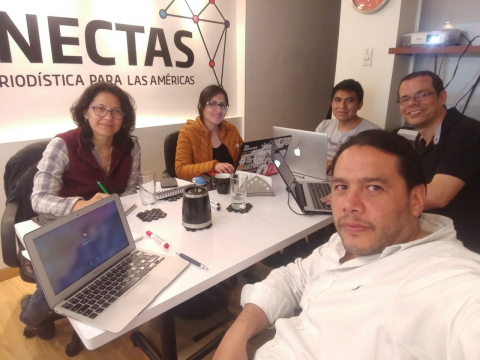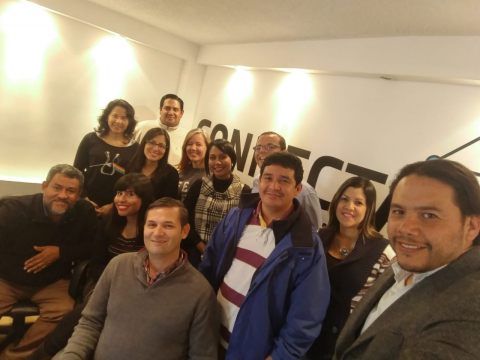
As Venezuela’s citizens suffer from rampant food shortages, the government is spending billions to bolster political allies in Latin America, a team of pioneering reporters recently revealed in an unprecedented expose.
CONNECTAS, a cross-border investigative journalism organization in Latin America, directed the project, called Petrofraude. Adding heft to CONNECTAS, ICFJ Knight Fellow Fabiola Torres López coached the reporters on their data efforts, helping them clean up and analyze thousands of government records.
The team uncovered that Venezuela doled out $28 billion of its oil resources to prop up 14 countries in Central America and the Caribbean, and accepted overpriced goods in exchange. Venezuela lost millions in the deals, while those in power appeared to have lined their pockets.
CONNECTAS boasts a community of more than 100 journalists active in 15 Latin American countries. It partners with the International Center for Journalists (ICFJ) to support reporters exposing abuses of power as part of the Investigative Reporting Initiative in the Americas. To produce Petrofraude, CONNECTAS assembled a team of journalists from four newsrooms: El Pitazo (Venezuela), Diario Libre (Dominican Republic), La Prensa Gráfica (El Salvador) and Confidencial (Nicaragua).
“One of the signature elements of this collaborative journalism project is that it follows a trail of money across borders, tracking not only who received the funds but also what they were buying,” said CONNECTAS Director Carlos Eduardo Huertas. “The project demonstrates how to carry out in-depth investigations in places where freedom of the press is weak and access to information poor.”
Venezuela is one of the least transparent countries in the Americas. The journalists overcame this challenge by creating their own databases from sources outside of Venezuela. For example, they extracted data from other governments’ publicly available documents, filed information requests with neighboring countries and manually recorded results from online videos of meetings or votes.
“Building new databases provides an exceptional value,” said CONNECTAS journalist David González. “Our data becomes a source of information for future studies, reviews and even revisions. We are helping to recover this wealth of information that was lost or inaccessible.”
In addition to coaching the team on data efforts, ICFJ Knight Fellow Torres coordinated the project’s digital presentation, brainstorming with the team and designing creative ways to showcase the project’s many graphic and multimedia components.
Petrofraude used drone footage, for example, to show incomplete construction projects that Venezuela financed in Haiti with a $2.1 billion loan following the devastating 2010 earthquake. Another multimedia element - an interactive data visualization - reveals inconsistencies in the amount various Latin American countries paid for Venezuela’s oil.
"We used new technologies and data journalism to illustrate the reasons behind the crisis in Venezuela today," said Torres.

The journalists faced significant security risks throughout the Petrofraude investigation. In December 2018, police ransacked and took control of the newsroom of Petrofraude’s Nicaragua media partner, Confidencial. Confidencial’s director, Carlos Chamorro, went into exile in Costa Rica just before his outlet published the investigation. Chamorro said he faced “extreme threats” in his home country.
Petrofraude has received attention around the world. In Jan. 25 remarks from the U.S. Senate floor, Sen. Dick Durbin (D-Ill.) called the project “a collaborative and brave Venezuelan media effort” that spotlighted the corruption in Venezuelan President Nicolás Maduro’s administration. Spanish-language media in the United States, including The New York Times newsletter and TV broadcaster Univision, have recently highlighted the project. Influential newsrooms in Germany, Colombia, Mexico and Peru, as well as international news agency Reuters, have also picked it up.
The revelations come during major crises for Venezuela, once among the wealthiest countries in South America. Maduro was sworn in for a second term in January, though the United States and other nations are publicly backing his challenger, Juan Guaidó. The country’s unprecedented humanitarian crisis and severe inflation have led to the mass emigration of three million people, according to the United Nations.
Check out Petrofraude in Spanish or English to read all of the findings.
Sara Menocal is deputy director of the ICFJ Knight Fellowships.